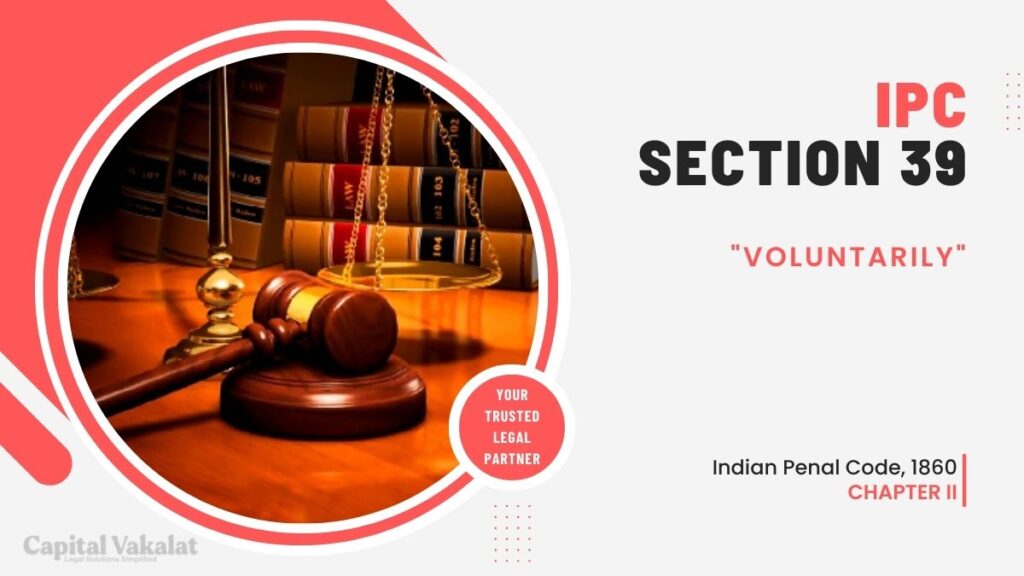In the realm of legal frameworks, understanding the nuances and implications of various sections is crucial. One such significant section in the Indian Penal Code (IPC) is Section 39, which deals with the term “voluntarily.”

This article delves into the depth of Section 39 IPC, dissecting its essence and implications.
Introduction to Section 39 IPC
Section 39 of the Indian Penal Code serves as a pivotal element in understanding the intention and voluntariness behind criminal actions. The section lays the foundation for assessing whether an act was committed voluntarily or under coercion.
Defining “Voluntarily” in Legal Terms
In legal parlance, “voluntarily” refers to an action that is undertaken by an individual without external compulsion or duress. It signifies that the person has acted with free will, fully aware of the consequences.
Voluntariness in Criminal Acts
The aspect of voluntariness is a fundamental principle in criminal law. It distinguishes between actions committed willingly and those that are a result of force, fear, or fraud. For an action to be deemed criminal, it must be done voluntarily.
Degrees of Voluntariness
Voluntariness is not a binary concept; it exists on a spectrum. While some actions are entirely voluntary, others might be influenced by various factors, leading to partial voluntariness or diminished capacity.
Intent and Voluntariness: Their Interplay
Intent and voluntariness often go hand in hand. Establishing intent is crucial in determining the level of voluntariness behind an act. Intent reflects the purpose behind an action, while voluntariness focuses on the absence of external forces.
Factors Influencing Voluntariness
Several factors can influence an individual’s degree of voluntariness, including mental capacity, emotional state, external pressures, and even cultural or societal factors. These elements need careful consideration in legal proceedings.
Case Studies: Interpreting Voluntarily
Examining past legal cases helps in understanding how courts interpret the concept of voluntariness. Landmark judgments have shaped the understanding of voluntary actions and the implications they carry.
Challenges in Establishing Voluntariness
Proving voluntariness can be complex, especially in cases where external factors cloud an individual’s judgment. This challenge raises questions about how the legal system weighs different elements to arrive at a fair judgment.
Role of “Voluntarily” in Different Offenses
The term “voluntarily” holds distinct significance in various criminal offenses. From theft to assault, its presence or absence can determine the severity of the crime and the subsequent punishment.
Voluntariness vs. Coercion
Distinguishing between acts done voluntarily and those done under duress is essential. The boundary between the two can be fine, and legal proceedings must carefully examine the circumstances to deliver justice.
Evolving Legal Perspectives on Voluntariness
As societal norms change, so does the interpretation of voluntariness. Legal perspectives on what constitutes voluntary actions can evolve over time, shaping the outcomes of legal cases.
Controversies Surrounding Section 39 IPC
Despite its importance, Section 39 IPC isn’t without controversies. Debates arise about its applicability in certain cases, leading to discussions about potential reforms in legal definitions.
Criticisms and Debates
Critics argue that the concept of voluntariness might not adequately consider cases involving vulnerable individuals or those under emotional distress. These debates prompt a reevaluation of legal standards.
Importance of Establishing Voluntariness
The concept of voluntariness is the cornerstone of fair legal judgments. It ensures that individuals are held accountable for actions they undertake with conscious intent, rather than those forced upon them.
Conclusion
In the intricate landscape of criminal law, the term “voluntarily” serves as a guiding light. Its multifaceted nature encapsulates the essence of free will, intent, and accountability. As the legal system continues to evolve, a robust understanding of Section 39 IPC remains pivotal.
Certainly! Here are a few external resources that provide further insights into the concept of “voluntarily” in Section 39 IPC:
- “Understanding Section 39 IPC” – A comprehensive article that breaks down the legal intricacies of Section 39 IPC and its application in different legal scenarios. Read more
- “Landmark Cases Involving Section 39 IPC” – A curated list of significant legal cases where Section 39 IPC played a pivotal role in determining criminal culpability. Explore the cases
- “Debates on Voluntariness: Legal Perspectives” – An insightful podcast episode featuring legal experts discussing the controversies and debates surrounding the concept of voluntariness. Listen here
- “Reforms in Section 39 IPC: Current Discussions” – An article highlighting the ongoing debates and proposed reforms concerning the interpretation and application of Section 39 IPC. Read the article
These resources delve deeper into the subject, providing diverse viewpoints and in-depth analysis related to “voluntarily” in Section 39 IPC.
FAQs
How do courts interpret voluntariness in legal cases?
Courts analyze various factors, including mental state and external pressures, to determine the degree of voluntariness in an action.
Can an action be partially voluntary?
Yes, voluntariness exists on a spectrum, ranging from entirely voluntary to partially voluntary based on influencing factors.
Why is intent important in establishing voluntariness?
Intent reflects the purpose behind an action, supporting the notion that it was done willingly.
Is voluntariness an evolving concept?
Yes, as societal norms change, so does the interpretation of voluntariness, shaping legal perspectives over time.